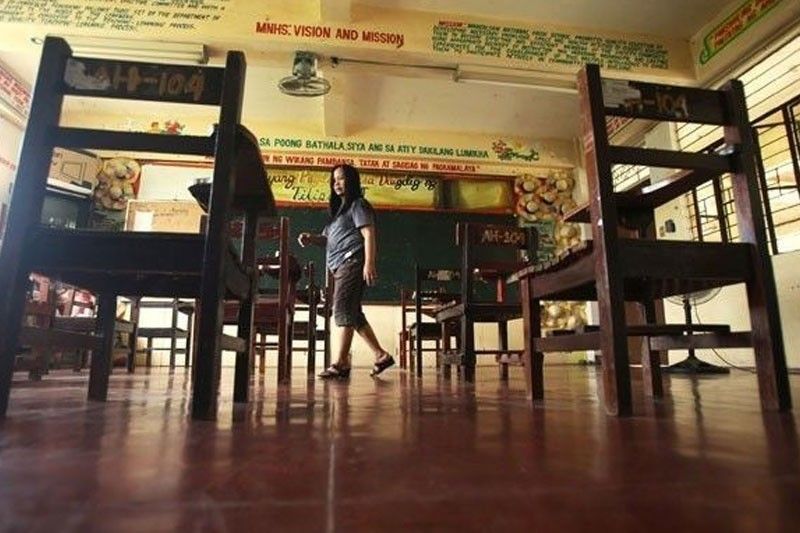DepEd power to shape curriculum faces test amid uproar over 'CSE'

MANILA, Philippines — The Department of Education's power to determine schools' curriculum — a function as old as the agency itself — is facing an unusual test as lawmakers use the debate over sex education to question whether the agency can tweak its curriculum without Congress' explicit approval.
During a House basic education committee hearing on Monday, January 27, panel chair Rep. Roman Romulo (Pasig City) challenged DepEd's implementation of comprehensive sexuality education (CSE) since 2018 despite the absence of a specific law on CSE.
"Why are they implementing the CSE curriculum already when they know in fact it is being debated in Congress? Should they not have waited before they implemented this?" he asked during the hearing.
Monday's hearing aimed to review DepEd's curriculum for CSE, specifically its "legal basis" and "status of implementation."
DepEd in 2018 integrated CSE concepts across different subjects like Science, MAPEH and Edukasyon sa Pagpapakatao through DepEd Order 31 s. 2018. It says in a briefer that this is done through a "grade level age and developmentally appropriate approach" that is tailored to fit the country's local context.
While DepEd has historically made curriculum changes without requiring new legislation, Romulo argued that sex education warranted different treatment.
"This is not a simple curriculum revision like in history or English. This will affect our values and customs," the solon told Philstar.com in a phone interview.
"The term comprehensive sexuality education is not defined under Philippine law. So they will use international agreements which are more all-encompassing," he said, adding that DepEd should have waited for Congress to define CSE through legislation first.
The biggest change to DepEd's curriculum in recent years — the introduction of the MATATAG curriculum for Kinder to Grade 10 — was rolled out in 2023 without an enabling law.
Defining CSE
During the hearing, Romulo pressed DepEd officials about who introduced the term CSE in the department.
When DepEd officials present couldn't immediately identify who introduced the concept, the lawmaker expressed concern over what he saw as an attempt to "normalize" the term.
DepEd Order 31 was issued under then-Education Secretary Leonor Briones.
"Very dangerous. The term is very dangerous kasi pag inadopt natin lahat yan... Ang masama doon hindi mahintay ang Congress – both the House and the Senate – to deliberate on the matter," the lawmaker said during the hearing.
CSE teaches students about age-appropriate sexuality topics – from physical health to emotional well-being. While DepEd Order 31 cited UNESCO's technical guidance on CSE, the department says it has adapted these concepts to fit Filipino contexts rather than adopting them fully.
The Marcos administration itself has recommended strengthening the implementation of CSE. No less than Malacañang's "Philippine Population and Development Plan of Action 2023-2028" — the government's roadmap directs different agencies, local government units and private schools to "fully rollout and implement ... CSE."
Romulo also had issues with what he saw as inconsistencies between DepEd Order 31 s. 2018 and another DepEd document that showed "intimacy and reproduction" as one of the topics that students will gain knowledge of during Kinder to Grade 3.
The lawmaker was referring to a technical document prepared by a member of its bureau of curriculum and development that aimed to guide the integration of CSE concepts in lessons. It is not the DepEd curriculum itself.
The document specifically lists topics like "body, including sexual body, gender" and "body rights," among others, as one of the topics to be learned under "K-Gr. 3 Core skills."
Romulo told Philstar.com that he sees this as part of a gradual expansion of CSE's scope. "In the beginning, it may be very strict. That's why they first released Department Order 31 which is very general. But it is a way of normalizing that term," Romulo said.
DepEd stands by 2018 policy on sex ed
DepEd Undersecretary Filemon Javier defended the agency's decision to retain the DepEd order enforcing CSE. "It currently still stands, but the directive to us is to continue to review it and ensure that the implementation would be appropriate," he said.
"At the moment, there is no direction to suspend it because, as we have initially reviewed, the text of Department Order 31 is consistent with the law and the contents of the curriculum is age-appropriate and culturally relevant," the DepEd official added.
Rep. Raoul Manuel (Kabataan Partylist) defended DepEd's authority during the hearing, noting that curriculum development is part of the agency's executive functions. "I don't think DepEd went overboard since organizing the curriculum is part of its executive functions," he said, adding that the agency acted on the urgent need to prevent teenage pregnancies.
In the phone interview, Romulo insisted that existing reproductive health education frameworks could address teenage pregnancy without introducing new terminology. "We can address the unintended teenage pregnancies using what is allowed by law right now. Why add other areas to be discussed?" he said.
Rep. Geraldine Roman (Bataan, 1st District), meanwhile, called on DepEd to conduct more consultation with stakeholders prior to rolling out a sex education curriculum, warning that "over-eagerness can be a defect."
The controversy emerged earlier this month when former Chief Justice Maria Lourdes Sereno and family rights advocates of Project Dalisay launched an online campaign against Senate Bill 1979 or the Prevention of Adolescent Pregnancy Bill. This bill aimed to formalize and integrate CSE lessons across all levels with the guidance of international standards.
Both DepEd and the bill's author, Sen. Risa Hontiveros have clarified in separate statements that:
- The bill itself contains no mention of masturbation or exploring sexualities
- "Guided by international standards" doesn't mean copying everything
- DepEd says its actual curriculum is localized and age-appropriate
Delaying sexual activity
Roots of Health, a Palawan-based organization that teaches CSE in schools, says the current controversy stems from misconceptions about what CSE actually teaches.
"CSE does not teach or encourage children to engage in sexual activity. Instead, its primary goal is to delay it," the organization said in a statement sent to Philstar.com.
In Palawan, where Roots of Health has taught 100,000 students and trained 6,500 teachers in CSE over 15 years, the teen pregnancy rate in Puerto Princesa has decreased by 60%, according to the group.
"The data is clear: CSE reduces teenage pregnancies, reduces maternal and child mortality, improves school retention, and helps young people plan for a better future," the group said.
- Latest
- Trending






























